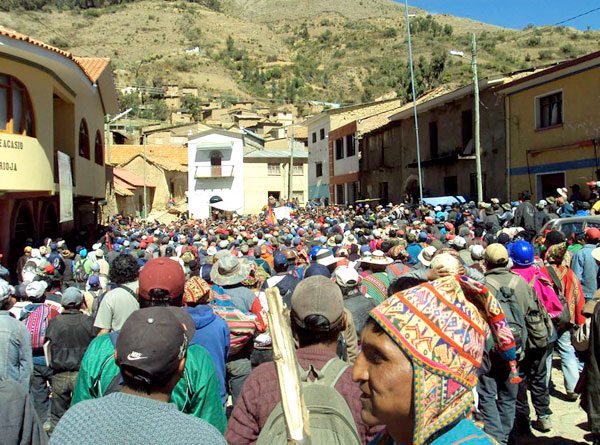 Bolivia – (July 13, 2012) – Violence strikes again for foreign mining investments in Latin America. President Evo Morales of Bolivia seized and nationalized the assets of Canadian mining company South American Silver (TSX:SAC) Wednesday after conceding to the demands of leaders of indigenous communities opposing the project. Community protests against the project turned violent last week and one person was killed. Share value of South American Silver tumbled 20% in a single day with the news.
Bolivia – (July 13, 2012) – Violence strikes again for foreign mining investments in Latin America. President Evo Morales of Bolivia seized and nationalized the assets of Canadian mining company South American Silver (TSX:SAC) Wednesday after conceding to the demands of leaders of indigenous communities opposing the project. Community protests against the project turned violent last week and one person was killed. Share value of South American Silver tumbled 20% in a single day with the news.
Mallku Khota, 350 kilometers (217 miles) south of La Paz, Bolivia, is home to one of the world’s largest deposits of silver, indium and gallium, in which South American Silver has invested US$16 million in exploratory work since 2007. Last week’s protests turned violent as government authorities deployed 370 police forces to rescue 3 hostages (2 Bolivian mining engineers hired by South American Silver and 1 policeman) out of a total of 7. Four of the hostages had already escaped on their own. On Sunday, Bolivian Labor Minister Daniel Santalla signed an agreement with the Mallku Khota leaders, promising to revoke the company’s mining concession in exchange for the release of three of the prisoners.
This is not the first time President Morales has seized control of a foreign-owned company. Last month Bolivia nationalized Glencore International PLCs’ (LSE: GLEN) Colquiri zinc and tin mine after weeks of protests led to clashes. Bolivia has also nationalized oil, natural gas, and communications companies operating in the country.
Risk of resource nationalization has grown in the last year and continues to be the number one risk facing mining and metals companies operating in resource-rich nations around the world, according to an Ernst & Young report published on Monday.
Similar nationalist moves and outright mining bans in other Latin American countries such as Venezuela, Costa Rica and more recently, Argentina, as well as rising community conflict in countries like Perú and Argentina, are sending messages indicating that the Latin American region may not be as friendly to foreign direct investment in extractives as previously thought. In May, President Cristina Fernandez de Kirchner in Argentina seized a majority share of the country’s largest oil company, YPF (NYSE:YPF), from Spain’s Repsol, re-nationalizing the company which had been privatized in the 1990s. Just in the last few months, conflicts in Perú at both the Conga (Newmont) and Tintaya (Xstrata) mines were stricken with severe violence.
As investors seek refuge from collapsing financial markets around the world, the recent turn to extractives, particularly as gold and silver prices soared, is now flashing red warning lights. Rising community opposition, increased regulatory complications, and the grinding to a halt of financial write-offs and other tax incentives, is presenting an increasingly complex and riskier landscape for extractive companies and investors.
For more information:
Jorge Daniel Taillant
[email protected]
+54 9 351 507 8376
